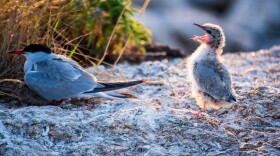-
Blue jays are common around the U.S. but not always popular at bird feeders.
-
The project is aimed at protecting Bobolinks and other birds that use hayfields to nest and raise their young in the early summertime.
-
The elusive yet bold spruce grouse is a little-known N.H. inhabitant that relies on forests that are specifically adapted to colder temperatures.
-
The virus is circulating in some wild birds here. But so far, it hasn’t spread to any commercial poultry flocks or dairy herds.
-
It may not seem like it, but the days are slowly lengthening, and there are other bright spots in a cold and windy landscape.
-
Migrating is one of the most dangerous times in a bird’s life. Turning off lights at night, putting stickers on windows, and keeping cats indoors can help.
-
New research from Dartmouth shows potentially harmful levels of mercury in black guillemot chicks, contributing to scientists’ understanding of mercury exposure for seabirds.
-
A seemingly routine construction project caught the eye of some local nature lovers, who say the grocery chain disrupted a vital habitat for local species.
-
Learning bird songs and calls links you to a kind of birding folklore passed down from generations of birders.
-
Want to know how hundreds of millions of birds die every year? Just look out the window.

Play Live Radio
Next Up:
0:00
0:00
Available On Air Stations










